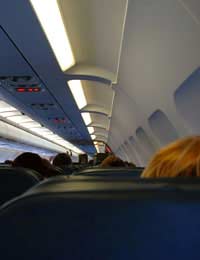Hypnosis and Fear of Flying

Hypnotherapy is a method of treating a variety of both physical and psychological disorders by using the power of the mind to overcome challenges and behaviours.
It uses the principle of suggestion allowing the subconscious mind to communicate with the conscious mind, changing perceptions, beliefs and attitudes of the person.
For hypnotherapy to be effective the person must be willing to co-operate and must really want to overcome their problem. If the treatment works, it can be a very powerful tool and will change the client’s perception and awareness of the disorder from which they are suffering.
How Does Hypnotherapy Help Overcome Aerophobia?
Hypnotherapy is explained as achieving a ‘heightened sense of awareness’ by the processes used, usually by a trained hypnotherapist, who alters the state of consciousness, and then opens up the mind addressing the issues surrounding aerophobia, the origins of the problem and exploring and tackling negative thoughts and images associated with this type of phobia. Once the background and origins of the phobia have been discovered and understood, positive changes can be suggested and implemented.During the assessment stage, the therapist will determine the clients need for the treatment and will discuss aims and outcomes of a full treatment programme, whether this be wanting to enjoy travel, visit a friend abroad, be more comfortable flying or to simply be able to bear a flight.
The person undergoing hypnotherapy will be awake during the treatment and will have a unique and individual experience.A trance-like state is achieved by being talked through tasks and techniques by the hypnotherapist until a deep state of relaxation is achieved.
Following full treatment the aims and goals determined at the assessment stage of the treatment should have been met and the person can be confident that they have regained control of their problem and can confront it without feeling anxiety or distress.
Who Performs The Therapy?
Hypnosis is usually carried out by a trained hypnotherapist who has been professionally trained in the art of hypnosis and only uses approved methods that are known to be safe.Everyday people are able to teach themselves hypnotherapy using a variety of methods such as DVD’s, CD’s or books, which may be a less expensive option, though it is unknown whether these methods of learning will achieve success rates as high as those found by professional therapists. The prices charged by a hypnotherapist vary greatly; a lot of this depends on their reputation and success rate. Costs can typically be between £30 and £60 for a session, and sessions can be from 45 minutes to over an hour. Patients may need only one session or a series of sessions to gain the maximum benefit.
The treatment may be provided at the hypnotherapist’s office/treatment room, or in the patients own home.
It is most important to choose your therapist carefully as potentially anyone can set-up as a hypnotherapist and charge full prices knowing there will be no success. Always check your therapist’s certification and memberships of professional organisations. It may be worth telephoning the organisation and checking that membership exists.
There are a wide variety of self-hypnosis treatment packages available either in the high-street shops or on the internet. The success rate is very dependant on the user's compliance and ability to follow instruction.
Hypnotherapy is not guaranteed to be of benefit to everyone, but it may be worth trying in order to gain some personal control over your phobia, lowering the need for other therapies and medications.
- Fun Facts About Flying
- Using of Aromatherapy for Anxiety
- Can Valium be Prescribed for Nervous Flyers
- Herbal Remedies For Relaxation And Stress Relief
- Neuro-linguistic Programming (NLP)
- Relaxation Therapy
- Time Line Therapy
- Aerophobia Clinics and Courses
- Music Therapy to Treat Phobias
- Phobia Cure Products
- The Use of Psychotherapy for Phobias
- Anxiety Medication
- Cognitive Behavioural Therapy and Phobias
- Systematic Desensitisation
- The EMDR Technique
- The Emotional Freedom Technique


Re: Why Some People Have a Fear of Flying
A hydrofoil with a hull Is primitive, rather dull; Must not it sink Should engines kink? Airplanes crash and crack…
Re: Aerophobia Clinics and Courses
I am absolutely petrified of flying however I have agreed to fly in July to Spain. I am flying with my two young children, both…
Re: Anxiety Medication
Please help I'm absolutely terrified of flying and I go away in two wks , I really don't know how I'm going to cope I have tryed diazepam in…
Re: What Causes The Fear of Flying?
My 13 year old daughter is now so afraid of flying that we were unable to go on our last holiday in March. We arrived at the…
Re: How I Overcame My Fear of Flying: A Case Study
At Southport we were flying to Ostend in a Bristol44 aircraft It taxied along the runway ,just before…
Re: Doors to Automatic: What is That all About?
Very good I've always wondered what Doors to automatic and cross check means
Re: What is Aerophobia?
i dont have aerophobia but sky phobia…
Re: Hypnosis and Fear of Flying
The difficulty with phobias is that there are often underlying problems so that one phobia reveals another and so on. General…
Re: Why is Turbulence Not Usually Dangerous?
hi, i love flying but get really scared during turbulence…strange question but if you were looking at a plane that…
Re: Why Some People Have a Fear of Flying
I am terrified of flying... Over the sea especially :-(. We fe flying from London to Lisbon. So over the bay of…